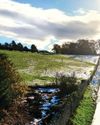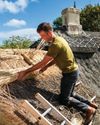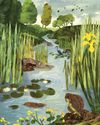
After 20 minutes scouring Charmouth Beach, eyes flitting from side to side, I spot it: the unmistakable curve of ribbed shell half-embedded in a lump of mudstone - an ammonite. Gingerly, I rock the ancient fossil to and fro, easing it free from its petrified prison of who knows how many million years. Turning it over, marvelling at this miraculous object, I realise that I am the first person ever to hold it in my hand.
The Mary Anning Rocks sculpture celebrates Lyme Regis´s pioneering palaeontologist.
It's an auspicious start to my journey along the Jurassic Coast. This 95-mile stretch of shore mostly in Dorset, but nudging just into east Devon - is blessed with awe-inspiring geological formations and fossil deposits that have garnered it recognition as England's only natural UNESCO World Heritage Site. Snaking east from Orcombe Point near Exmouth to Old Harry Rocks near Swanage, it's studded with monumental rock arches, seemingly endless shingle beaches and fossil beds from which treasures were prised that altered our understanding of prehistory.
This extraordinary landscape was formed over the Mesozoic era, which began 250 million years ago and encompassed the Triassic, Jurassic and Cretaceous periods. Layers of sediment deposited during periods of changing environmental conditions became tilted and crumpled by tectonic activity sparked by the breaking apart of the supercontinent Pangaea, and the subsequent formation of the continents as we know them now. Over the past few hundred thousand years, erosion has sculpted the dynamic coastline we see today.
Denne historien er fra September 2024-utgaven av BBC Countryfile Magazine.
Start din 7-dagers gratis prøveperiode på Magzter GOLD for å få tilgang til tusenvis av utvalgte premiumhistorier og 9000+ magasiner og aviser.
Allerede abonnent ? Logg på
Denne historien er fra September 2024-utgaven av BBC Countryfile Magazine.
Start din 7-dagers gratis prøveperiode på Magzter GOLD for å få tilgang til tusenvis av utvalgte premiumhistorier og 9000+ magasiner og aviser.
Allerede abonnent? Logg på

TOP 10 BEAUTIFUL WALKING TRAILS
Planning a major hike this year? We reveal the UK's most beautiful long-distance paths to explore in 2025

Free to feel good
We know time outdoors makes you feel better, but if you have a disability, getting out there isn't always easy. That's why charities like the Calvert Trust aim to give everyone the freedom of the countryside.

Vanishing fog
As new findings suggest fog may be disappearing from our world, Fergus Collins meets fog chaser Laura Pashby who treasures its power to transform landscapes - and ourselves

Smithfield's closure will be the end of an era, but it still has a future
What connects the great Victorian novelist Charles Dickens, the comedy actor TerryThomas and a branch of the Henson family?

Electric dreams
Could this new cycling route in the Shropshire Hills become a star of Britain's bikepacking scene? Matt Baird mounts an electric bike to navigate the hills, thrills and basilicas of the Marcher Castles Way

Up on the roof
Thatched roofs have been a part of the British countryside for 5,000 years. Tom Allan is one of a dwindling number of craftspeople making sure this ancient tradition remains a vital part of our rural life.

Sniffer dogs and tiny loos - the fight to save water voles gets serious
What do you do to discover how a much-loved but fast declining and elusive mammal is faring in its battle for survival along our rivers, streams and ditches? First, recruit hundreds of volunteers for look-out duties. Then call in specially trained detector dogs and build tiny floating loos.

RSPB WARNS AGAINST USING FLAT BIRD FEEDERS
The RSPB is reviewing its bird-feeder products over growing concerns about the spread of disease among garden birds

ANCIENT CORNWALL
England's wild far-western shores are scattered with mysterious ancient sites. Melanie O'Shea walks you back through time to the Celtic roots of Cornwall's ruggedly beautiful West Penwith peninsula

Famous terrier breeds
Despite their naturally combative nature, terriers make great pets, with most breeds described as affectionate, friendly, loyal or playful - or a mix of them all. James Fair details six key breeds